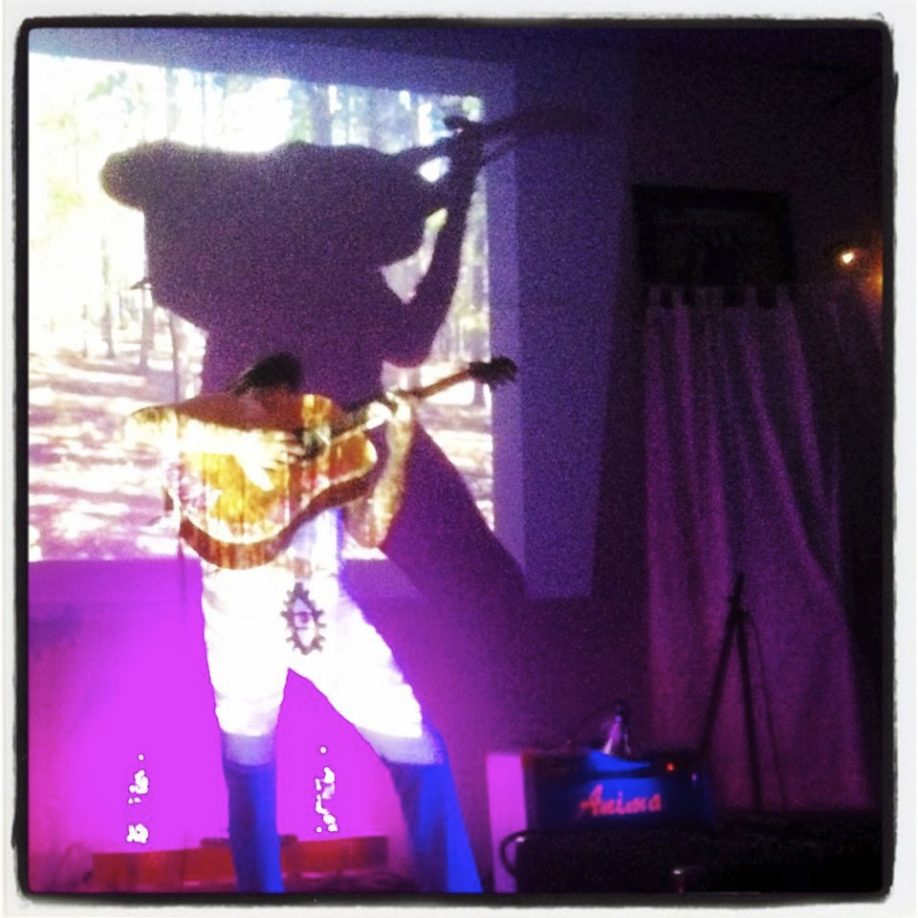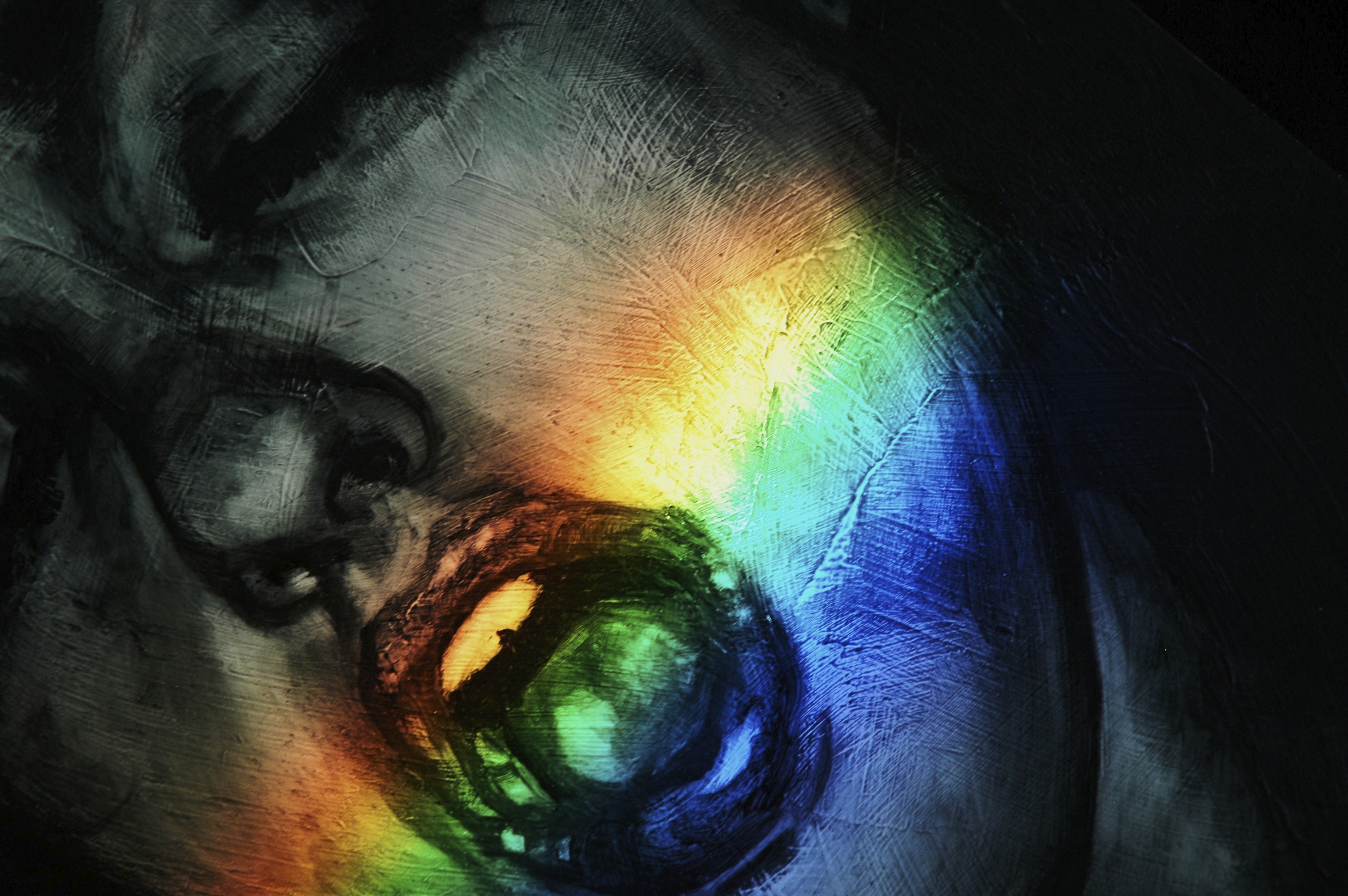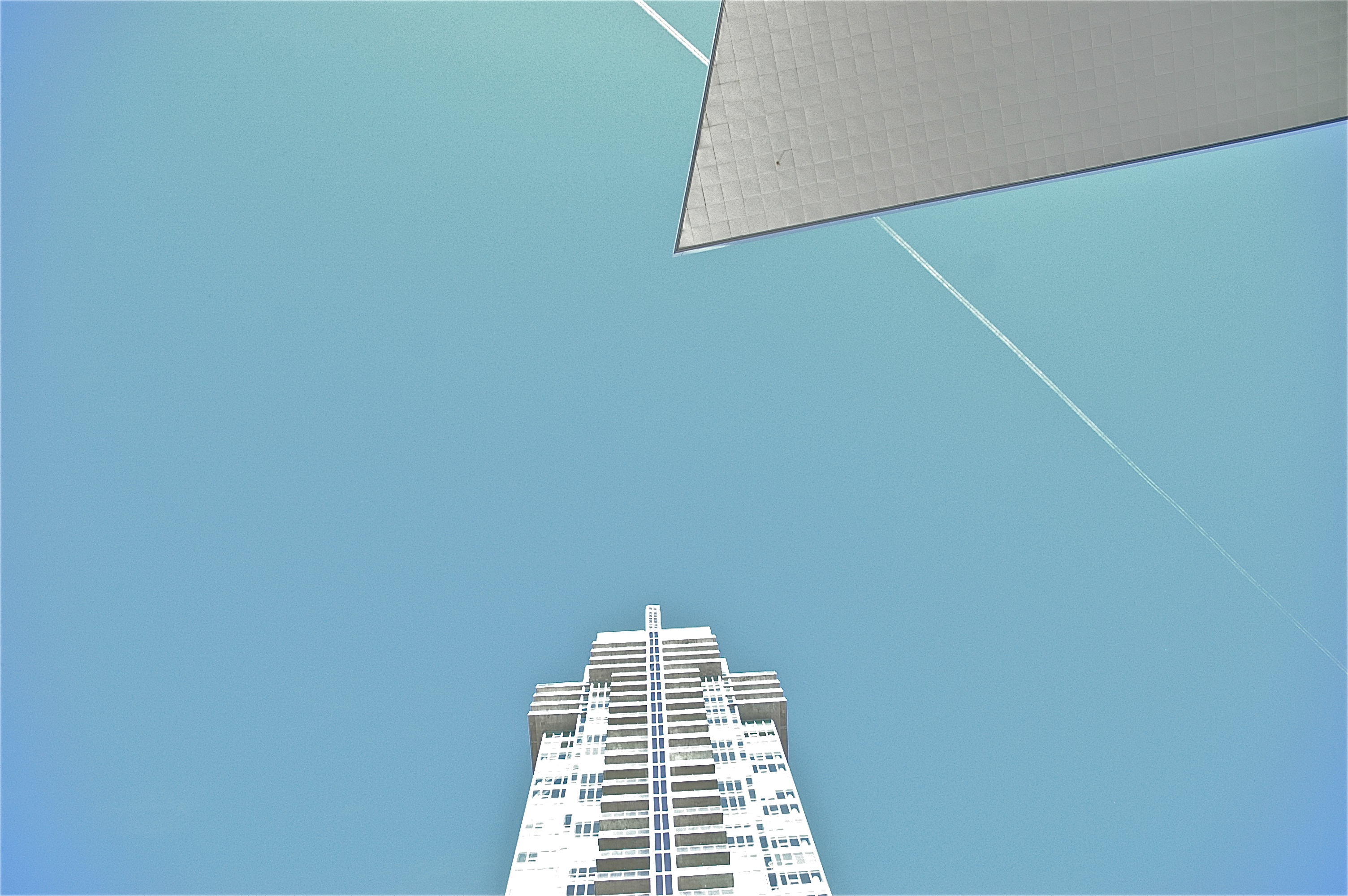A.S. Leena Res is the stage name for Andrew Linares, local Denver performer and musician; his show, Notes from the Collective debuted at The Bakery Arts Warehouse in May.
Vagina-eye and phallus mirror paintings hang on the soundproofed walls, Christmas-light-filled wine bottles and a disco ball set the mood, and an array of painted speakers and instruments demarcate the daily goings-on in A.S. Leena Res’ studio cum living room. We sit crosslegged on the floor, drinking coffee.
Can you give us a little synopsis of your latest project and the recent performances you’ve done?
Yeah, so I describe the whole show as a musical, multimedia journey through the unconscious. The motivation behind it: I took about four years off from creating completely, to kind of reevaluate a bunch of stuff, on a personal psychological level, and from there the project has corresponded with my own quest for self-understanding. I try to be honest and reflect that as much as I can.
I did the opening shows for Notes from the Collective, which is the full production show, and the last show that I did, ANIMUSity, was as stripped down as I could make the performance, acoustic guitar, stripping it down to its basic core.
I had a dream where this faceless, female figure asked me, What does it look like right before you wake up? At the time I was doing a lot of dream analysis—and that kind of sparked the project, that was the catalyst.
Your art engages with sexuality and gender in really interesting ways. Can you speak about what you were exploring there, what your interests are?
Within the psyche there is—and this is not just within male or female but within all of creation, really—there is masculine and feminine “energy,” essentially is what it comes down to. So in the process of self-understanding, the first one that I really focused on was the anima, the feminine, and what does that mean to actualize your feminine energy as a male. And that was a hard one for me; I didn’t cry for like 10 years.
If one wants to actually convey what’s going on on an unconscious level, I think you have to explore both the masculine and the feminine. I tend to think of the masculine (and making sure to express this: this is masculine/feminine, not male/female), but the masculine being the rational, of the head, and the feminine being of the emotion, of the intuition, of the body.
Growing up in Texas, it was so interesting, because I had this concept that a “Man” treats his body harshly, a Man’s supposed to have back problems—and I think inherent in that is also running away from emotion. So as an artist and as an individual, for me, exploring the feminine meant delving into the body.
So that kind of started off the process, an exploration of the feminine. I know anger, really well and I know happiness well—sadness was an emotion I did not experience for a long time, because a Man, doesn’t fucking do that, you know what I mean. And there are certain points in my body where I know sadness exists, kind of long-patterned, on a cellular level, so the project began with this exploration of the feminine.
Through the process, the couple of years I’ve been working on this, I’ve kind of come full circle back to exploring what is it to be a man. I feel like on some level I kind of ran away from the masculine and sat with the feminine for so long that I had to come back to what does that look like.
I had this experience—this is weird to talk about, but okay—I was dating this woman and she had this dog, and I noticed that I had a hard time being dominant with this animal, even though a dog, just like humans, we need boundaries, and we actually thrive under those circumstances. I had a hard time with it, because I had this fear of kind of masculine dominance, turning into abuse. And so, because I couldn’t No!, I couldn’t be direct with this fucking animal—it helped get me back in the process of looking at the masculine and being able to sit with that.
Your art seems to be having a conversation with traditional notions of sexuality and constructions of masculinity and male sexuality. Why are these themes important to you, and what are you trying to explore or say about them?
I was raised in a Latin family, very machismo, and this isn’t limited to Latin culture, this is prevalent everywhere—that men chase women, women are supposed to demure for a time, and then eventually, with persistence, like, okay, it’s yours. And that’s just so fucked up for so many reasons. I guess my art is a reflection of my life, so I’ll talk about my personal experience. Rather than a conquest, I’ve come to understand sexual relations as, just that, relational, a reciprocity.
Growing up in our culture, pornography is everywhere, and porn is driven by the male gaze, right, and I still struggle with breaking some of these thought patterns about this is how it’s supposed to look, or this is what it’s supposed to feel like. Most pornography is very master/submissive, with the female as the submissive and if that’s what people are into that’s totally fine, but I think the distinction is, is it a conscious decision, or is it something that just is?
It’s weird being a dude at this time, on a cultural level I think. I’ve known some very enlightened and strong and powerful women, and still there are times in which they want a man to just take charge. Now that’s a tough line to walk, because that’s also part of rape culture. There’s the idea of the masculine taking charge, being direct, and there’s a virtue in that; the issue with our culture is that’s been amplified to the point of excess and that’s inherent in rape culture.
I think it’s important for men to actualize and integrate both the masculine and the feminine within themselves, within their sex lives, within their daily existence, in every facet.
So in Notes from the Collective, I have an eye vagina as one of the symbols of the show; at some times in the show I had a vagina on my pants; there were other times I came out naked, but for a bullhorn on a phallus—and I guess I hadn’t really thought it about until right now, but that’s that balance that I’m alluding to, of trying to find that overlap, that Venn diagram of the masculine and the feminine coming together in this nice, healthy balance, that seems wobbly to me, that’s not fixed.
I’ll tell a story. I was working at the bar one day, and this dude drives up in, not the H2, I’m talking a full-on Hummer, fucking military assault vehicle. And he and his buddy get out, his buddy’s just like ripped, wearing a tank top; these guys are like “dude-bros.” I remember just looking at them trying to parallel park, like, what assholes.
So, they come in and order drinks, he knows my name but, long story short, he’s like, you don’t remember me, do you? And I’m like, I gotta be honest with you, I don’t. And as it turns out, he saw [my show] and he was talking with his friend, and he described my show, he said, it’s like the male “The Scream” [Edvard Munch’s]: all this stuff we wish we could say, but we never do. And man, floored me, cause I judged this guy to be just a superficial caricature.
And a lot the stuff I talk about on stage is really personal, and the faith that I go on is that, I’m not special, and if I’ve experienced this, a lot of other people have as well. All this to say, I think if men are more truthful with themselves, first, and then with other men, I think that’s a good start.
And, on the inverted side of that, I also think that women, speaking strictly from a male perspective, need to be open to men expressing this stuff, and also expressing uncertainty. What is appropriate, what isn’t, and being open to a dialogue about it. Because things are changing, not quickly enough, and yet they are changing rapidly. There’s a lot of uncertainty still there as far as what roles are. I think a lot about this and I get confused.
You’ve talked about being vulnerable onstage, and one of your videos begins with Michael Buffer’s infamous call to begin boxing and wrestling matches, “Let’s get ready to rumble!” conspicuously replacing “rumble” with “be vulnerable”—a very antithetical word to the violence, strength and prototypical masculinity associated with the sports of boxing and wrestling. Were you intentionally making that contrast?
That’s interesting, yes, that was one of those things that kind of came out; I just thought it was attention getting. But it goes back to, if you speak truthfully, it’s going to resonate with other people, because none of us are unique.
So what role is vulnerability playing in your art?
Learning to be vulnerable has been a huge shift for my life. And that’s also been part of me learning how to cry, as a dude. I still struggle with this with men; it comes easier to me to be vulnerable with women. Being vulnerable with men is still something that I struggle with, and I think a lot of men do. It’s only kind of socially acceptable for men to say I love you, when wasted. I see it working in a bar a lot too.
That seems to tie into the idea of balancing the anima and animus within ourselves and within our society, then.
Beyond the individual psyche, I think on a collective level we’ve got a lot of work to do as far as male relationships and opening that up. When I was in India, I found it so interesting that male friends will walk down the street holding hands. In this country, “I love you, man,” is construed only as homosexual.
And I think because things are so black and white—-you’re either gay, straight or bisexual, and bisexuality often gets treated as a myth, like pick a side—-I think if these constructs were perhaps allowed more gray area, especially male relationship constructs, I think if they were a little more fluid, a lot of this weird aggression shit that you see would go by the wayside. We have a lot of work to do, as men, in breaking down a lot of these social constructs.
So where do you see yourself going from here?
Prior to Notes from the Collective, everything I had ever done was collaborative; and that’s part of why this project had to start off as a one-man show. I needed to one, shape the vision, and two, prove to myself I’m capable of doing this, of actualizing something of this scope.
In between the opening and closing shows of NFC, I had this epiphany. On some level all of my creation has been based on this idea that I, Andrew am important and unique and have something unique and special to say. And I had this realization that I am neither unique nor special. That on some level it’s all a construction and an illusion. But I am, just as you are, just as this jar is—connected to something so much larger. It’s taken me a little bit to recover from the realization that I am not special.
I’m realizing that it’s not about me; I have a particular vision and I’m going to actualize it on the collective level. I need other musicians and artists and dancers to help me actualize this. So where I’m going from here is bringing in other people. And on some level it’s very scary to me to let go of that control, this is my baby—and I know that it’s something that I need to do. Ultimately, I want this to be a kinetic experience—I don’t want it to be a thing where “you the audience sit there and watch me the thespian”—I want it to be a collective experience, that we’re in this together.
Get in it. Check A.S. Leena Res out on facebook. Follow him on twitter @ASLeena Res.






One thought on “Glimpse into the Collective: An Interview with A.S. Leena Res”